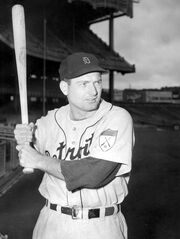
A photo of George Kell.
George Clyde Kell (born August 23, 1922 in Swifton, Arkansas) was a baseball Hall of Fame third baseman who played for the Philadelphia Athletics (1943-1946), Detroit Tigers (1947-52), Boston Red Sox (1952-54), Chicago White Sox (1954-56) and Baltimore Orioles (1956-57) in the American League. In the late 1940s and early 1950s, he was regarded as the best third baseman in the AL. George Kell died at his home in Swifton Arkanaas on Tuesday, March 24, 2009 at the age of 86.
Playing career[]
A solid right-handed hitter and a sure-handed fielder, Kell was a 10-time All-Star, batted over .300 nine times and topped the league's third basemen in assists and total chances four times and in fielding percentage seven times. He won his only batting title in 1949 (.343), denying Ted Williams his third Triple Crown; until the final week of the season, Williams had led the batting race. On October 2 1949, Kell went 2-for-3 while Williams was hitless in two official at bats. Kell's final mark was .34291, Williams's .34276. Kell also denied Williams his 3rd triple crown. One year later, Kell batted .340, leading the league with 218 hits and 56 doubles, but lost the batting title to Williams' teammate, Red Sox second baseman Billy Goodman.
In his career, Kell batted .306, with 78 home runs and 870 runs batted in, 881 runs scored, 2054 hits, 385 doubles, 50 triples, 36 stolen bases, a .482 slugging average, and 621 walks for a .367 on base percentage.
George Kell was selected to the Baseball Hall of Fame in 1983 by the Veterans Committee in his first year on their ballot, along with former Dodger manager Walter Alston. Kell was one of the most popular ballplayers. of his time.
Broadcasting career[]
Following his retirement as a player, Kell worked as a play-by-play announcer for the Orioles (1957), CBS television (1958), NBC radio (1962), and the Tigers (1959-1996). From 1975 until his retirement in broadcasting, Kell was joined on Tiger telecasts by fellow Hall of Famer Al Kaline as color commentator.
After the Tigers' World Series win in 1984, Kell remarked "if we get a little pitching out of Wilcox, this team could do it again." Alas, the Tigers got very little pitching out of Milt Wilcox after 1984 and did not return to the fall classic until 2006.
Broadcasting Style[]
Kell had a relaxed, easygoing "country-gentleman" style of announcing. In contrast to his compatriot Ernie Harwell, who opened his radio broadcasts with "Hiya, Tiger fans!", Kell traditionally opened his broadcasts with "Good EVE-ning, everyone!" When paired with colorman Larry Olsterman, the opening was often "Thank you Larry and good afternoon." Kell was also known for particular colloquialisms in his style, such as always referring to a high pitch near the batter's eyes as being "up in his wheelhouse". Kell also relayed stories of his Hall of Fame career in the same folksy style. A favorite story of his was about the incident when his jaw was broken by a line drive off the bat of Joe DiMaggio. "I got up, made the play at third, then passed out." He served briefly on the TV Game of the Week, then became an announcer for the Detroit Tigers, doing both radio and mostly TV work.
Personal[]
Kell served ten years on the Arkansas State Highway Commission (1973-83) and owns a car dealership, George Kell Motors, in Newport, Arkansas.
Best-selling author Elmore Leonard in the 1990 anthology Cult Baseball Players wrote that Kell was his favorite player. When the novelist threw out the first pitch at a June 15, 1999, Detroit Tigers game, Leonard wore a No. 21 jersey that was presented to him by the Tigers in an homage to Kell.
In February 2007, Kell was cited for hit and run after an accident in Jonesboro, Arkansas. [1] He previously suffered a broken arm and leg in a crash with an 18-wheel truck on Dec. 31, 2004. Kell continues to live in his hometown of Swifton.
Highlights[]
- 10-time All-Star (1947-54, 1956-57)
- 8-consecutive .300 seasons (1946-53)
- Led league in batting average (1949)
- Holds record of the fewest strikeouts for a batting champion (13, 1949)
- Twice led the league in hits and doubles (1950-51)
- Hit for the cycle (June 21950)
- Top 10 in AL MVP vote (1947, 1949, 1950)
See also[]
- Hitting for the cycle
- List of Major League Baseball batting champions
- List of Major League Baseball doubles champions
- List of major league players with 2,000 hits
- List of Major League Baseball doubles records
- Chicago White Sox all-time roster
- 1950 Detroit Tigers season
External links[]
- baseballhalloffame.org – Hall of Fame biography page
- Career statistics and player information from Baseball-Reference, or Fangraphs, or The Baseball Cube
| Preceded by: Ted Williams |
American League Batting Champion 1949 |
Succeeded by: Billy Goodman |
1947, 1948, 1949, 1950, 1951, 1952, 1953, 1954, 1956, 1957
